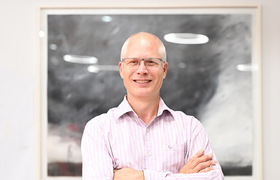Farewell from DVC Prof Francis Petersen
15 March 2017Dear colleagues and students
The Council meeting on 18 March will be my last official assignment at UCT before I take up my new post as Vice-Chancellor at the University of the Free State from 1 April. I would like to use this opportunity to thank you for your support and goodwill during the nine challenging and fulfilling years. I have been privileged to serve UCT first as Dean of the Faculty of Engineering & the Built Environment from 2008, and as Deputy Vice-Chancellor for Institutional Innovation from 2014.
As many of you know, in 2016 I was also asked to convene the Special Executive Task Team (SETT) to help UCT manage the myriad challenges linked to student and social protest. Though my time was split between these varied responsibilities, several milestones in my portfolios will stand out as special memories:
The insourcing project came about as a result of signing an agreement with the National Health Education and Allied Workers Union (NEHAWU) in October 2015 to insource staff from the six previously outsourced companies over a six-month period (initially five of the six outsourced companies in July 2016, and the sixth one in November 2016). As a result, we are delighted to have 1 200 new staff on board and my thanks go to the many people and departments involved in managing the significant logistics, from Human Resources and Finance to Properties and Services, and Student Affairs.
The Hasso Plattner Institute of Design Thinking, or d-school, was established at UCT’s Graduate School of Business in 2015 with R50 million from Hasso Plattner, and was formally launched this month. Innovation and innovative thinking is one of my passions, and the d-school will go a long way to creating new methodologies and thinking about the current challenges we face as a society and provide solutions that are human-centred. I am pleased to say that there is a very real possibility of securing future funding for a dedicated building, or part of a building, to house the d-school permanently.
The Recruitment, Development and Retention Programme is a broad human resources programme that is designed to groom young, early career academics, particularly those from disadvantaged communities, to become the next generation of UCT academics. Two main initiatives underpin this programme: the New Generation of Academics Programme (nGAP), which is funded by the Department of Higher Education and Training, and the Next Generation Professoriate (NGP). The latter has already yielded two new professors and two associate professors following the 2016 ad hominem promotions cycle.
When it comes to increasing UCT’s capacity as a research-intensive university, I believe the next paradigm shift lies where the disciplines meet, and where we can create new science sites, opening up new avenues of innovation through an inter- and transdisciplinary focus. I have worked on this with the Research Office and the deans and deputy deans for the past 18 months, with input from the Teaching and Learning Committee, the University Research Committee and the Board for Graduate Studies to develop a policy guideline which will enable the growth of inter- and transdisciplinary research and postgraduate teaching.
On the eve of leaving UCT, I want to encourage the campus community to continue opening up conversations. Through the Institutional Reconciliation and Transformation Commission (IRTC) Steering Committee we have had a good start, and hopefully the IRTC itself will foster this openness. We should never forget the importance of talking to one another. When it comes to the challenges facing the institution – whether these concern institutional culture, transformation, changes in the union landscape, or austerity measures – accountability and leadership may lie with management, but ownership and responsibility rest with everyone. Like other universities, UCT faces a tough period over the next few years and this asks not only for firm, engaged leadership but also asks for all staff and students to respond from the vantage point of, ’This is our institution, and we need to have a committed, responsible approach in making it better.‘ The IRTC will play a vital role in broadening that sense of ownership.
Yours sincerely
Professor Francis Petersen
Deputy Vice-Chancellor
Read previous communications:
 This work is licensed under a Creative Commons Attribution-NoDerivatives 4.0 International License.
This work is licensed under a Creative Commons Attribution-NoDerivatives 4.0 International License.
Please view the republishing articles page for more information.










